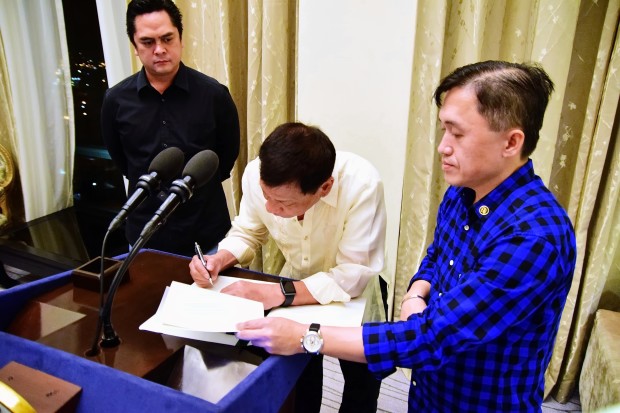Cebu media groups welcome Duterte’s signing of EO on FOI

President Rodrigo Duterte signs the executive order on Freedom of Information. PHOTOS FROM MARO-PCOO
CEBU CITY, Philippines—Media groups in Cebu welcomed the move of President Rodrigo Duterte to sign an executive order on Freedom of Information (FOI).
Elias Baquero, president of Cebu Federation of Beat Journalists (CFBJ) in Cebu, said the EO would allow every Filipino access to information on public transaction so they would be informed of what was happening within the government bureaucracy.
With the EO, “mayors, governors, regional directors of national government agencies and other heads of offices cannot anymore prevent the media and the people and the people in securing public documents their scrutiny or research,” he said in a statement.
CFBJ is the umbrella organization of all reporters, correspondents, photographers and cameramen covering the different beats in Cebu.
The Cebu Citizens Press Council (CCPC), on the other hand, hopes that the local officials would follow the EO and would “observe and be guided by it.”
Article continues after this advertisementLawyer Pachico Seares, CCPC executive director, said in a statement that the EO was a manifestation that President Duterte was serious about transparency and access to public information.
Article continues after this advertisement“CCPC has asked for specific limits on discretion of local officials to reject requests for public documents. We hope that with the E.O., that request will now be addressed by the local officials concerned,” Seares said in the statement.
“We must watch out for the limits on the right, in the exceptions to the E.O. that will be drawn up, the actual guidelines in securing the information, and the final version of the FOI Bill.”
The CCPC considered the EO an early fulfillment of an election promise made by Mr. Duterte and expected that Congress would finally pass the FOI bill.
Seares pointed out that President Duterte was able to do “what other presidents just kept paying lip service to.”
The CCPC is a Securities and Exchange Commission-registered non-government organization that helps to protect press freedom, enhance the sense of accountability of journalists, and shape public opinion on media issues.
Under the EO, every Filipino shall have access to information, official records, public records, and to documents and papers pertaining to official acts, transactions, or decisions, as well as to government research data used as basis for public document.
However, access to information shall be denied when the information falls under any of the exceptions provided for in the 1987 Constitution.
Filipinos may request for the information they need by submitting a written request to the government office concerned. The letter should contain a proof of identity of the requesting part, a description of the information needed and the purpose of the request.
Requesting for information in government offices shall be free of charge.
However, the offices may charge a “reasonable” fee to shoulder the actual costs of reproduction and copying of the information being requested.
Under Section 15 of the executive order, any employee or public officer who will fail to comply with the provisions of the EO may face administrative and disciplinary actions.
The Department of Justice and the Office of the Solicitor General are directed to prepare a list of exceptions within 30 days from the date of the effectivity of the EO.
Aside from the agencies in the executive branch, state universities and colleges and government-owned or controlled corporations are also covered by the order. TVJ
RELATED VIDEO